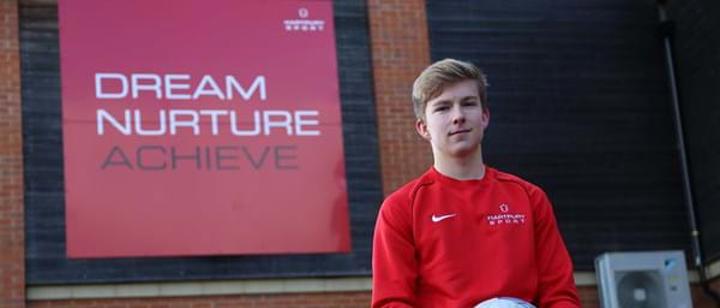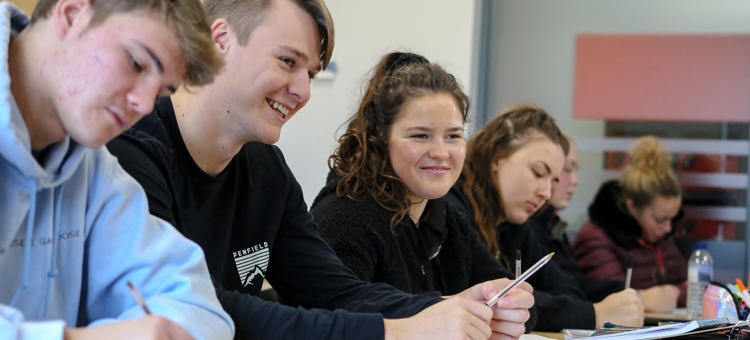Course Overview
Do you have a genuine interest in the way living organisms work and how they interact with their environment? The Biology A-level develops essential biological knowledge and understanding of key biological concepts.
You'll learn how to analyse and evaluate scientific concepts from the destruction of tropical rainforests to gene cloning. You'll also learn to appreciate how society makes decisions about scientific issues and how biology contributes to the success of the economy and society.
A-level Biology is valued by universities and employers alike, and opens many doors to wide and varied career choices including veterinary medicine, dentistry and physiotherapy.
Biology can be combined with a wide range of other A-level subjects. The combination will depend upon future career plans and option blocks. Students wishing to enter the area of Medicine, Veterinary or Equine Science commonly combine Biology with Mathematics and Chemistry.
For a career in the Sporting arena Biology combines well with PE. Studying Biology alongside Psychology or Geography gives a variety of possible career paths and the subjects work well together.
Ultimately, Biology can be combined with virtually any other subject.
At Hartpury, we follow the OCR exam specification for A-level Biology.
For A-level, Biology staff also deliver Pre-Vet, Biological Skills and offer supervised study to further enhance academic progress and progression opportunities. Some are also examiners with the relevant exam boards.
On this course you'll study the following topics over two years.
- Development of practical skills in biology
- Practical skills assessed in a written examination
- Practical skills assessed in the practical endorsement
- Foundations in biology
- Cell structure
- Biological molecules
- Nucleotides and nucleic acids
- Enzymes
- Biological membranes
- Cell division, cell diversity and cellular organisation
- Exchange and transport
- Exchange surfaces
- Transport in animals
- Transport in plants
- Communication, homeostasis and disease
- Communication and homeostasis
- Excretion as an example of homeostatic control
- Neuronal communication
- Hormonal communication
- Plant and animal responses
- Photosynthesis
- Respiration
- Biodiversity
- Genetics, evolution and ecosystems
- Cellular control
- Patterns of inheritance
- Manipulating genomes
- Cloning and biotechnology
- Ecosystems
- Populations and sustainability
The majority of A-level lessons are delivered from the classrooms in our College Learning Centre, and our modern science laboratories, providing a modern learning environment, contemporary classrooms with smart boards, well-equipped library and learning resources.
Lessons are delivered in a traditional manner and include individual tasks as well as group work. A-level students will be set regular homework tasks as well as regular assessments throughout the academic year.
A-levels offers a unique timetable facilitating sporting development and extra-curricular activities, and a full enrichment programme to enhance employability skills and the holistic development of all students.
A-level students have access to our equine and sport facilities, animal collection, and our commercial Home Farm.
Students have a pastoral tutor who will support them to succeed in their studies and their enrichment activities. All students have access to our academic and wellbeing support teams who run regular workshops and one-to-one sessions on campus and online. In addition, all students have access to medical professionals on campus.
Exam board: OCR Biology A
Total of six hours assessment split over three examination papers (2 x 2 hours 15 minutes and 1 x 1 hour 30 minutes) taken at the end of the two year course. A wide range of question types including: multiple choice, short answer and extended response questions. Opportunity to demonstrate your knowledge of both theory and practical skills through the examinations.
To help prepare you for your exams throughout the course, you’ll complete regular end-of-topic assessments, homework tasks and mock exams. These will help track your progress and highlight areas to improve.
An A-level in Biology can be combined with subjects like PE, Psychology, Chemistry, Environmental Science or Geography and can lead to a wide range of exciting progression routes. Students may go on to careers in physiotherapy, healthcare, medicine, biosciences, sustainability, or education.
Popular combinations include Biology with PE for roles in physiotherapy or coaching; with Psychology for nursing or neuroscience; or with Chemistry for careers in medicine, dentistry or research. Pairing Biology with Environmental Science or Geography can support careers in ecology, land management or environmental planning.
These combinations support national skills priorities in health, life sciences, education and clean energy. Locally, they align with Gloucestershire’s skills needs in health and social care, agriculture, rural enterprise and green technologies.
Course Overview
Course information
Do you have a genuine interest in the way living organisms work and how they interact with their environment? The Biology A-level develops essential biological knowledge and understanding of key biological concepts.
You'll learn how to analyse and evaluate scientific concepts from the destruction of tropical rainforests to gene cloning. You'll also learn to appreciate how society makes decisions about scientific issues and how biology contributes to the success of the economy and society.
A-level Biology is valued by universities and employers alike, and opens many doors to wide and varied career choices including veterinary medicine, dentistry and physiotherapy.
Biology can be combined with a wide range of other A-level subjects. The combination will depend upon future career plans and option blocks. Students wishing to enter the area of Medicine, Veterinary or Equine Science commonly combine Biology with Mathematics and Chemistry.
For a career in the Sporting arena Biology combines well with PE. Studying Biology alongside Psychology or Geography gives a variety of possible career paths and the subjects work well together.
Ultimately, Biology can be combined with virtually any other subject.
At Hartpury, we follow the OCR exam specification for A-level Biology.
For A-level, Biology staff also deliver Pre-Vet, Biological Skills and offer supervised study to further enhance academic progress and progression opportunities. Some are also examiners with the relevant exam boards.
What you’ll learn
On this course you'll study the following topics over two years.
- Development of practical skills in biology
- Practical skills assessed in a written examination
- Practical skills assessed in the practical endorsement
- Foundations in biology
- Cell structure
- Biological molecules
- Nucleotides and nucleic acids
- Enzymes
- Biological membranes
- Cell division, cell diversity and cellular organisation
- Exchange and transport
- Exchange surfaces
- Transport in animals
- Transport in plants
- Communication, homeostasis and disease
- Communication and homeostasis
- Excretion as an example of homeostatic control
- Neuronal communication
- Hormonal communication
- Plant and animal responses
- Photosynthesis
- Respiration
- Biodiversity
- Genetics, evolution and ecosystems
- Cellular control
- Patterns of inheritance
- Manipulating genomes
- Cloning and biotechnology
- Ecosystems
- Populations and sustainability
How you’ll learn
The majority of A-level lessons are delivered from the classrooms in our College Learning Centre, and our modern science laboratories, providing a modern learning environment, contemporary classrooms with smart boards, well-equipped library and learning resources.
Lessons are delivered in a traditional manner and include individual tasks as well as group work. A-level students will be set regular homework tasks as well as regular assessments throughout the academic year.
A-levels offers a unique timetable facilitating sporting development and extra-curricular activities, and a full enrichment programme to enhance employability skills and the holistic development of all students.
A-level students have access to our equine and sport facilities, animal collection, and our commercial Home Farm.
Students have a pastoral tutor who will support them to succeed in their studies and their enrichment activities. All students have access to our academic and wellbeing support teams who run regular workshops and one-to-one sessions on campus and online. In addition, all students have access to medical professionals on campus.
How you’ll be assessed
Exam board: OCR Biology A
Total of six hours assessment split over three examination papers (2 x 2 hours 15 minutes and 1 x 1 hour 30 minutes) taken at the end of the two year course. A wide range of question types including: multiple choice, short answer and extended response questions. Opportunity to demonstrate your knowledge of both theory and practical skills through the examinations.
To help prepare you for your exams throughout the course, you’ll complete regular end-of-topic assessments, homework tasks and mock exams. These will help track your progress and highlight areas to improve.
What can you do after this course?
An A-level in Biology can be combined with subjects like PE, Psychology, Chemistry, Environmental Science or Geography and can lead to a wide range of exciting progression routes. Students may go on to careers in physiotherapy, healthcare, medicine, biosciences, sustainability, or education.
Popular combinations include Biology with PE for roles in physiotherapy or coaching; with Psychology for nursing or neuroscience; or with Chemistry for careers in medicine, dentistry or research. Pairing Biology with Environmental Science or Geography can support careers in ecology, land management or environmental planning.
These combinations support national skills priorities in health, life sciences, education and clean energy. Locally, they align with Gloucestershire’s skills needs in health and social care, agriculture, rural enterprise and green technologies.
To study A-level Biology, you’ll need a minimum of five GCSEs at grade 4 or above. This must include Mathematics at grade 6 and Biology at grade 6 or higher – if Combined Science has been studied, you'll need a double grade 66.
As part of your application, you’ll need to include a short personal statement. We recommend reading our Personal Statement Guidance to help you include all the right information. You can add your statement when you apply via our Online Application Form.
If we need any additional details to support your application, you may be invited to take part in a short telephone interview with a member of the relevant course team.
You should expect some small costs for books and stationery. There will also be opportunities to take part in trips related to the topics you are studying. In the past, these have included visits to Alton Towers, the Houses of Parliament, JCB, Uttoxeter, and the Cadbury Factory. These trips incur a charge/are covered by the educational visits fee.
Students are required to pay a non-refundable educational visits fee at enrolment.
Which other A-levels does this work well with?
A-level Biology typically goes well with: Mathematics, Chemistry, Physics, Psychology, Physical Education, Geography and Sociology
Can I study A-level Biology and play in the Sports Academy?
This will depend which other A-levels you are studying. Where possible we try to work academy timetables around academic timetables, however this is not always possible. Please email to discuss your individual circumstances.
Can I bring my horse and study A-levels?
Yes - we provide students with the opportunity to bring their horse (or horses) with them while they study. On-site livery is offered to students on a DIY or full livery basis. This is subject to availability as demand is always high. Fees apply.
How much does the course cost?
If you're a UK student under the age of 19 enrolling in full-time A-level courses at Hartpury College, you typically won't need to pay tuition fees. For further information, details for those over 19 year-of-age and international students, visit: Finance | Hartpury College

Outstanding
Rated 'Ofsted Outstanding in all areas' for academic and curriculum-related provision

99.4% pass-rate
With an A-level pass rate of 99.4% (Hartpury College 2025), our outcomes for students are exceptional.

Living in on-site college accommodation at Hartpury, you’ll be part of a vibrant and international community of students of all ages who share their experience of life at college and university together on one campus.

The Hartpury Certificate is an enrichment programme designed to support our students to grow.


A-levels or a diploma?
Are you unsure about whether A-levels or a BTEC Diploma are the right choice for you? Find out the key differences and which qualification would best suit your learning style and your career and further study ambitions on our dedicated page.









